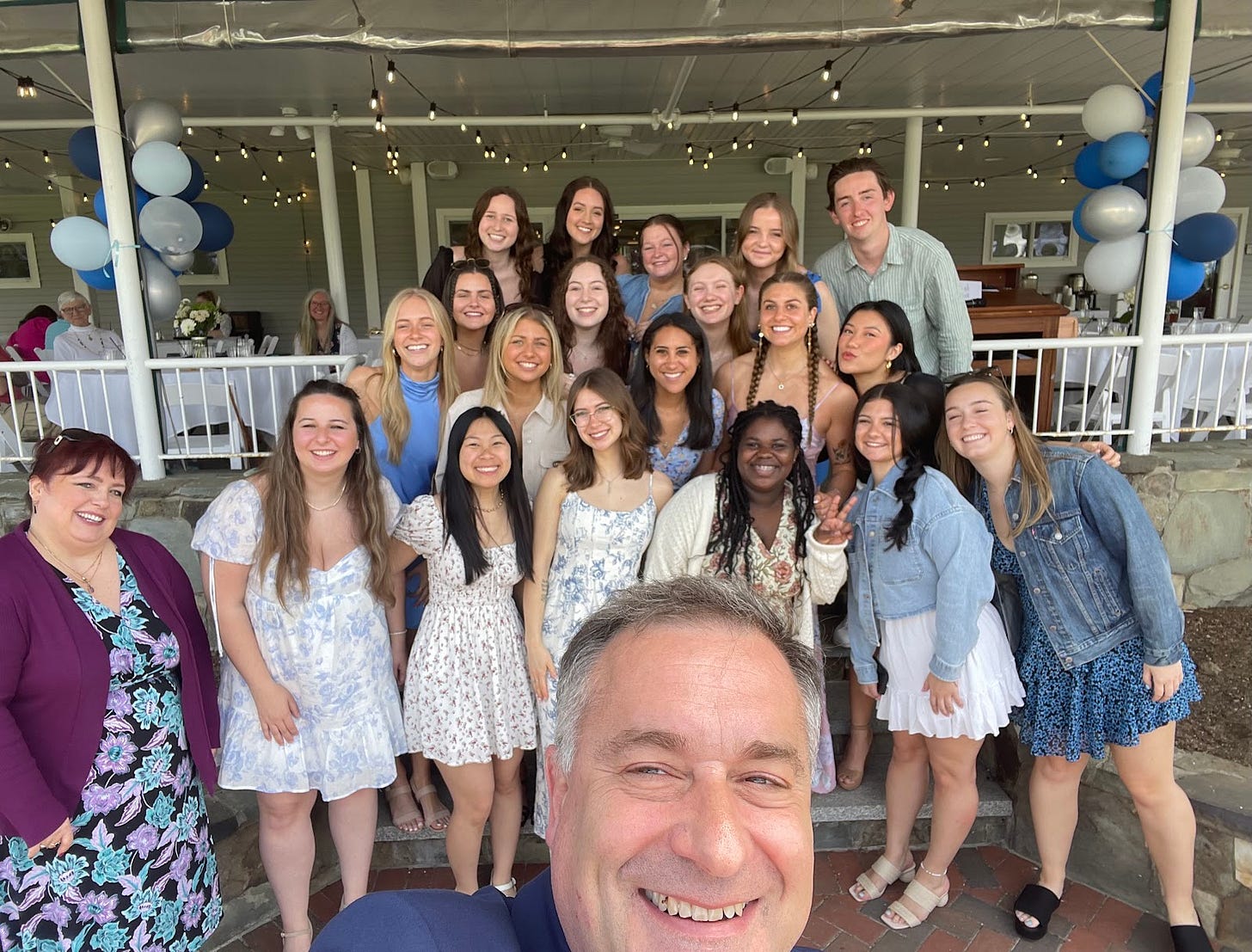I’m getting this week’s newsletter out late because it was a hectic, fun-filled graduation weekend and I just plain ran out of time. The weekend kicked off with our annual senior banquet, which was actually a brunch this year. The kids wanted one more selfie with me, so here is my big, fat head in the front. We made some speeches, gave out some gifts, shook hands with parents - it was a lovely time, preparing us for graduation on Sunday. Sunday was the real deal, and it was exciting because not only did one of my students get to be a speaker, but one of them sang the National Anthem, which was AMAZING! Sent chills all over me while I was listening - due check it out on YouTube here: https://www.youtube.com/live/Bc-zmHTKFZo?si=4fVwQVjYSS_-4Ava&t=997
This weekend’s events had me thinking about the nature of ritual. There is a lot of literature on rituals, and I poked around a bit at it while I was thinking about this essay, but what follows is a brief reflection mostly from my own observation. Rituals, major or minor, private or public, help us transition roles and cement our identities. Rituals are different from routines in that they are imbued with meaning.
My morning routine is pretty straightforward most days. I get up, get some coffee, take my old-man pills, exercise, shower, then shave. With minor variation, that is my routine. The fact that I shower before I shave has no particular meaning, it’s just more efficient. Our routines emerge usually as we stumble along, looking for the least effortful way of doing something. Good routines make their component tasks gradually disappear from our consciousness.
Ritual, on the other hand, often takes rather mundane activities and raises them up in our consciousness, with the purpose of helping us embrace or cope with a transition. We inhabit numerous roles throughout our day, and throughout our lives. On an intra-day basis, we may transition from home and being a spouse or parent, to the office where we are a boss or worker, or even transitioning while at the office between boss and worker depending on who we are talking to (are we talking to our colleagues? Employees we supervise? Or are we talking to our boss? You might go through multiple transitions even in the same meeting as you talk to one person and then another.). Then we head back home again, transitioning back from work to home. Some people have routines that are actually minor rituals that help them cope with the transition from work to home - changing clothes, having a cup of tea, etc. I remember reading a study that talked about a man who actually had a separate entrance to his house that he would go in through, after which he would take a shower (to wash away the work day) and change into his home clothes before he interacted with his family. That’s a bit extreme, but if you examined yourself, you may find you have routines that actually help you make role changes. As you change roles, you change which parts of your identity are activated. The man I just described needed this elaborate process to be able to turn off his work identity and turn on his husband-father identity. I would call this a minor ritual - switching between established roles and activating different parts of an existing identity are often enabled by minor rituals.
A major ritual would be one that establishes a new social role and new social identity. The college graduation ceremony is an example of a major ritual. For a certain subset of people, it is the marker of an end of (an extended) adolescence and the taking on of new responsibilities as well as privileges. As one leaves school behind, people around the graduate now have different expectations. One should find one’s own way and become financially independent, establish a household, perhaps begin the process of family formation. Watching the kids walk across the stage on Sunday, their energy was palpable - pride and fear - a potent and appropriate mix. The ritual helps with the “sinking in” of the identity.
Of course, the conferral of a degree can happen without the ritual. I did not attend my PHD graduation - it felt anti-climactic as I had defended my dissertation months before, and I was living some 2,000 miles away. But some role transitions require the individual’s (or individuals’) presence. Marriage, for example, requires people to stand in front of an authority (religious or secular) and go through a ritual process of consenting to their change in legal status (role). “I take thee to be my lawfully wedded husband/wife” has to be said. It is not enough to sign the marriage license. A simple courthouse marriage is, of course, just as legal as an elaborate wedding with all the Instagram-inspired accouterments, but the presence of family and friends as witness, the walking of the bride down the aisle, solidifies the identity in the minds of the people getting married, and the people around them. The transition from the role of single person to married person is eased.
TLW says laughs at me because I talk about ritual all the time. We should find ways, I think, to pause and appreciate life. Rituals help with that. I don’t know that I have that many small rituals in my day-to-day life. But I do know I probably have fewer routines than I should - I could definitely be more efficient. But being a professor gives me the opportunity to participate in some of the big rituals of young peoples’ lives. It really is a privilege.


